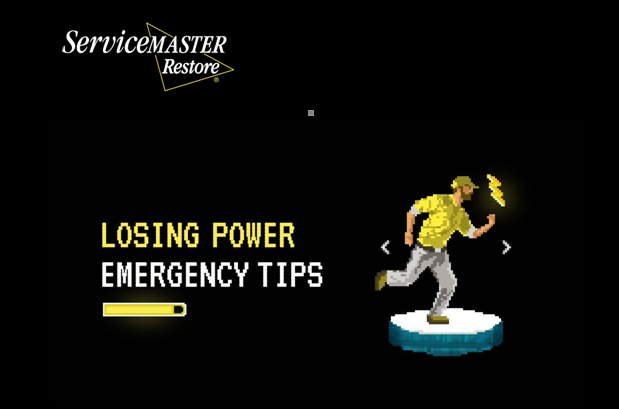Whenever a severe storm or weather event occurs such as a thunderstorm, tornado, hurricane, winter storm, or flash flood, there is always a risk of a power outage. These storms typically knock out power by damaging transformers and powerlines that feed electricity to homes and buildings. Power outages occur unexpectedly, even during severe weather, and they can be disruptive and even dangerous if the power is out for an extended period.
Because power outages can happen virtually any time there is severe weather, it is important for you to be prepared for the possibility of a power outage before it happens. Having a plan in place will help you react quickly in the event of a power outage to protect your property and ensure the safety of you and your family.
Issues Caused by Power Outages
When the power is out for an hour or two, it is an annoying inconvenience. However, serious problems can arise when the power is out for hours, days, or even weeks. The following issues may result from a power outage:
- Perishable food items may spoil without power to the refrigerator or freezer and water may become contaminated.
- Electronic devices and appliances may become damaged from fluctuations in power. It is best to unplug electronics and appliances during a power outage and plug everything back in one by one when the power returns.
- The heating and air conditioning will stop working if the power is out which can lead to uncomfortable temperatures in the home.
- People won’t be able to use electric-powered medical equipment such as CPAP machines and stair lifts which can put their health and safety in jeopardy.
- For homes that have sump pumps, power outages stop the pumps from working which increases the risk of flooding during the storm.
- Communications, water and utilities, and transportation can be severely interrupted by large scale power outages.
- Essential businesses such as grocery stores, banks, gas stations, and schools may be forced to close.

The possibility of a power outage should not be taken lightly as it can be disruptive to your home or business and even potentially dangerous if the power is out for a long time.
Preparing for a Power Outage
Being prepared for a power outage ahead of time can help you mitigate the issues created by an outage and better endure the time that the power is out. You can take the following steps to ensure that you are adequately prepared for a power outage:
- Make an emergency kit: It is important to have a stock of supplies ready for when the power goes out. Put together an emergency kit that includes supplies like food, water, flashlights, batteries, a first aid kit, medications, and any other tools and supplies you may need. You should have enough supplies to last for at least a couple of days, whether you must evacuate or you are stuck inside the home.
- Prepare devices: If the power goes out, you will not be able to charge smartphones, laptops, and other devices that allow you to communicate and get real time updates about the weather conditions in your area. Before a storm, charge your electronic devices in case you experience a power outage and have alternative charging methods ready. You can also take the extra step of unplugging electronics and appliances in anticipation of an outage.
- Be aware of community resources: You should find out if there are emergency plans or dedicated safe areas in your community that would be helpful in a power outage.
- Prepare before a storm: If a major storm is expected, start putting together emergency supplies and charge your phones and devices. If you are dependent on medical devices or other equipment that need power to function, have a plan for a backup power source.
- Prepare your car: Fill up your gas tank before a storm as a power outage may cause gas stations to close. You will be ready to evacuate if necessary and you can use your car to charge phones and get weather updates.
- Share the plan: Make sure everyone in your household is familiar with the plan and knows what to do in case of a power outage.
What to Do During a Power Outage
When the power does go out, it is important to remain calm and remember to put your plan into action. You can help protect your family and your property during the outage with these tips:
- Prevent carbon monoxide poisoning: It is very important to use equipment such as generators, charcoal grills, and camp stoves outdoors, at least 20 feet from a door or window. Using these devices in enclosed spaces can raise the levels of carbon monoxide and increase the risk of poisoning. You should also avoid using dryers, ovens, gas stovetops, or grills to heat your home.
- Prevent fires: Use battery powered flashlights and lanterns for light and avoid using gas stoves or ovens for heat. Make sure fireplaces, portable heaters, and wood-burning stoves are used safely.
- Do not leave vehicles running: You should never leave your vehicle running inside your garage, even with the garage door open. If you want to run your car for power or warmth, do it while the car is safely outdoors. You should only run your car for limited amounts of time to conserve gas.
- Do not open refrigerators or freezers: Keeping refrigerators and freezers shut during an outage will help keep the contents cold. A refrigerator can keep food cold for about 4 hours before it starts to go bad. Freezers can maintain a safe temperature for about 48 hours.
- Unplug electronics and appliances: If you did not do so before the outage, unplug all electronics, appliances, and other equipment that requires electricity to prevent damage from power surges.
- Follow water advisories: Pay attention to water advisories and use bottled water or boiled water if necessary.
What to do After a Power Outage
The return of the power is a welcome relief. However, there are a few steps you must take before resuming your normal activities:
- Check your food: Check the food in your refrigerator and freezer. Food that has been exposed to temperatures of 40 degrees Fahrenheit or higher for more than 4 hours should be thrown away. You should also dispose of food that looks or smells spoiled.
- Replace refrigerated medications: Refrigerated medications should be thrown out if the power was out for a day or more unless the label of the drug says otherwise. Call your doctor or pharmacist if you are dependent on refrigerated medications and they will help you take the next steps.
- Plug in electronics and appliances: If you unplugged your appliances and electronics during the power outage, plug them in one at a time after the power returns to prevent surges that could cause damage.
Disaster Restoration and Repair from ServiceMaster S&R Systems
The possibility of a power outage should not be taken lightly as it can be disruptive to your home or business and even potentially dangerous if the power is out for a long time. Following the steps outlined above will help you effectively prepare for power outages and react when there is an outage to protect yourself, your family, and your home.
If your home is damaged by a severe storm, including water damage or flooding, our professionals at ServiceMaster S&R Systems can help. We provide complete restoration services to help homes and businesses impacted by storms, including water damage restoration and structural repairs. Our technicians work diligently to remove standing water and dry your property and we can stabilize and repair structural damage caused by water, wind, and debris.
You can reach ServiceMaster S&R Systems at (630) 896-0030 for emergency disaster restoration services following severe storms throughout the Chicago, IL area.
